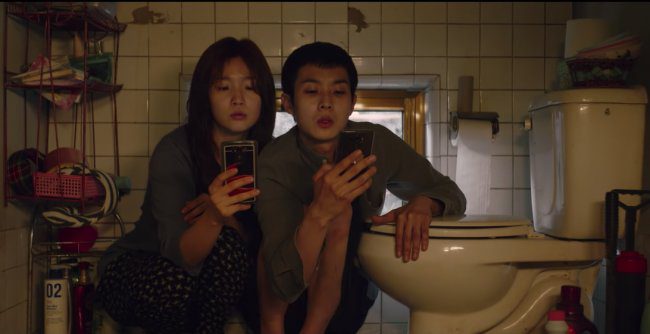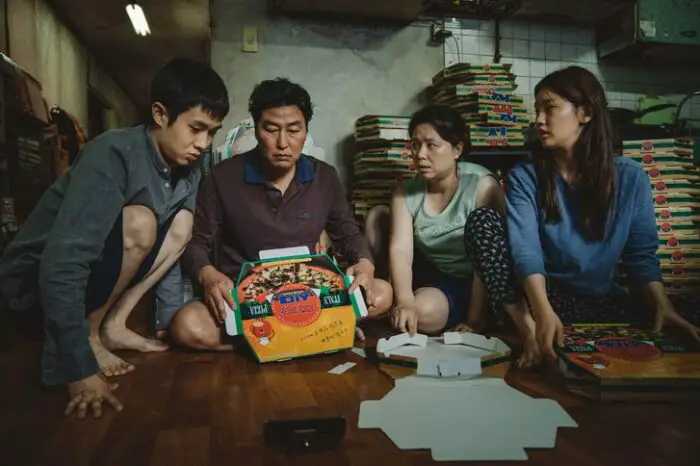Parasite might currently be a sleeper hit taking the film world by storm but its director, Bong Joon Ho, is hardly an overnight sensation. His most popular films have generally landed in the genre realm, but trying to classify them has been difficult. His kaleidoscopic tonal changes and willingness to oscillate between grim realness and absurd comedy has allowed his entries to rise above the heavily saturated field of science-fiction/fantasy/horror/thriller into something notably different.
Bong’s recent releases have included socially conscious tales centering specifically around class relations, environmentalism, and ethics. In his dystopian thriller Snowpiercer, adapted from a French graphic novel of the same name, the metaphor for the disparity in class couldn’t be more evident: the last remnants of humanity exist on one long train in which the poor and unlucky barely survive at the back while the rich and pampered use brute force to keep the front clear of undesirables.

In the Netflix original Okja, the setting is less futuristic but the metaphors are equally as thick. Just like most of the rich folks at the front of the train in Snowpiercer, the rich elites in Okja are depicted as either emotionless husks of corruption or blissfully ignorant of reality. The film, which focuses mainly on a girl’s devotion to her massive super-pig that was created by a mega-corporation as a business venture (just watch it…it’s hard to explain), also skewers the concept of celebrity, the self-serving nature of protest groups, and our blind allegiance to branding.
With Parasite being the third film in what I dub his Class Warfare Trilogy, Bong has brought all his ideas from the two previous films and funneled them into a seamless motion picture that manages to be both uniquely Korean while, at the same time, incredibly universal. Unlike his prior two features, Parasite’s reliance on realism is so on-the-nose that it could be mistaken as satire. But there is nothing to satirize here as the living nightmare of reality is too true to be made up.

The Kim family is going through rough times, but only because they allow it to. A true lack of ambition is the real culprit as no one in the clan, from laid back Ki-taek (Song Kang-ho), his quick-witted wife Chung-sook (Jang Hye-jin), their aloof son Ki-woo (Choi Woo-shik), and their icy daughter Ki-jeong (Park So-dam), is doing a hell of lot to help the situation, finding odd jobs, like folding pizza boxes (poorly), and stealing a neighbor’s wi-fi the extent of their efforts to keep up their lackadaisical lifestyle.
However, Ki-woo lucks into an English tutoring job overseeing a rich high school girl named Park Da-hye (Jung Ji-so) whose family, led by industry tycoon Park Dong-ik (Lee Sun-kyun) and his flighty wife Choi Yeon-gyo (Cho Yeo-jeong). Despite failing the entrance exams to get into college three times, Ki-woo’s play-acting, along with masterfully designed fake college paperwork from his sister, gets him a regular gig.
Before long, the Kims find ways to get rid of every vital position in the Park household and fill the roles in themselves assuming new identities. Ki-taek shoots for the driver position while the family’s indomitable maid is replaced by Chung-sook using nefarious and cruel means. With Ki-woo entrenched (and slowly seducing Da-hye) and Ki-jeong inserted as an art teacher to the Park’s rambunctious young son Da-song (Jung Hyun-joon), the family begins to take advantage of their suddenly lavish lifestyle.
However, the Park family home carries a dark secret within its walls and behind its closed doors. While the Kims become less diligent in maintaining their deception, the truth and the past are surrounding them, which could mean life or death not just for them but to the Parks, who have obliviously let the Kims become extended members of their family.

To say Parasite is a genre-resistant masterclass is an understatement. When I looked up times to attend a screening of the film on my local theatre’s website, Parasite was listed as a comedy/drama/suspense/thriller. But even that is limiting in its description as you could easily see Parasite also a horror film, a mystery, or even a surrealist fever dream. In fact, the title of the film itself can be seen as carrying multiple meanings and thus avoiding classification.
For who (or what) is the parasite in this story? Is it the disenfranchised lower class, who literally use an astounding amount of energy and intelligence towards criminality that would naturally better serve them if utilized in legit business? Or is it the hopelessly wealthy upper class that is so encased in a world of luxury that they can’t see those they step on beneath them? Determining who wronged who first and who is the true victim in this society is as muddy as the classic question of the chicken or the egg.
Parasite tests the audience’s limits for character sympathy because of this. The Kim family are, supposedly, the protagonists of the film. There are moments of warm camaraderie between the four family members that make you root for their success overall even though all the fun they are having tricking their rich marks becomes increasingly sinister and dangerous.
But on the other side of it, the rich folks might deserve it, right? Bong’s approach to the economic elite is scathing. Dong-ik, for one, is a selfish CEO who spends money on a whim and takes that as a true sign of his love for his creative son and his blossoming daughter. And Yeon-gyo is shown as a gullible materialist who seems to exist on another planet mentally. These people are essentially trapped in a realm, represented by their modern home, that doesn’t involve real people or real emotions. Yet, at the hands of the Kims, they are victims. They, personally, have not done anything to them. So do they deserve the deception?

It is a classic battle not of good vs evil but of rich vs poor; a Korean Upstairs, Downstairs for the 21st century. And despite representing real class divides in South Korea, where the gap between the working class and the elites is growing ever wider, thanks to educational access and vocational disparity, Parasite’s timeless tale of the big vs the small is definitely universal. Maybe there aren’t any actual good guys or bad guys: just the disenfranchised filled with anger and the rich who literally think the poor stink.
The ultimate problem with reviewing this film is that a simple plot synopsis or a breakdown of one facet of its existence (in this case, the class warfare portion) can’t truly do justice to the breadth of the film’s landscape. Nor can it capture the experience you’d have watching it as an unsuspecting audience member. The film has garnered 48 total award nominations thus far and we haven’t even entered the big award season yet (where Parasite is expected to be a massive Oscar contender). Something is right with this picture…you should go find out what it is.



